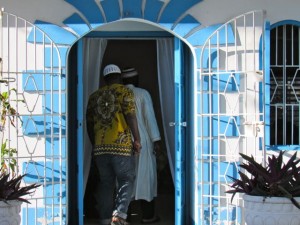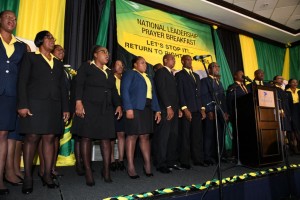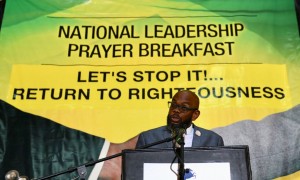
How About An Interfaith Prayer Breakfast?
January 20th, 2018
I was present at this year’s 38th National Leadership Prayer Breakfast, the annual ritual at the Jamaica Pegasus Hotel. I was seeing it for the first time, and was struck by the huge room full of people. A few women were wearing hats and most people were in their “Sunday best.” It was dominated by men in suits and what we used to call “dog collars” or other clothing denoting their religious calling. There were three or four men to every woman – surprising, perhaps, since I understand most church congregations consist mostly of women.
They were all Christians. The main speech (or sermon, if you wish) was given by a man (has a woman ever given such an address at the Breakfast?) – Reverend Astor Carlyle, Senior Pastor of the Webster Memorial United Church in Half Way Tree. Rev. Carlyle started by singing a few phrases from Buju Banton’s Untold Stories and went on to present an eloquent address. There were some very long sentences and some rhyming words, lots of alliteration too. “Moral choices” are to be made, he said to polite (but growing) applause. We need a “moral revolution,” he urged, and a collective responsibility. The sermon (for such it was) was powerfully delivered. The reverend gentleman mopped his brow and proceeded to take a dig at other pastors in their big churches, sitting in poor and deprived communities. Some of the breakfasters loved this, clapping and cheering.
It was a terrific performance, offering us food for thought and having a cathartic effect.
The National Prayer Breakfast started in the year after a terrible year in Jamaica’s history – 1980, an election year when politically motivated gangsters fired at each other on the streets in an atmosphere of tension and conflict. In 1981, the aim of the event was to try to restore national unity, especially among Jamaican leaders.
The event is invitation only. At least two thirds of the invitees are in fact church leaders – a good networking opportunity for them, at least.
In the United States, the Prayer Breakfast has been around for a long time (1953). The format is quite different from ours, and it is largely organised by political entities rather than churches, but the aim is much the same – to bring leaders together to discuss matters of pressing national concern. The range of keynote speakers, however, have included people from all walks of life – authors, film directors, businessmen – even the singer/activist Bono – and not exclusively religious leaders. I am sure they were all inspiring, in their way. Interestingly, they appear to have been mostly men, too (except for Mother Teresa of Calcutta, in 1994).
So, bearing all of this in mind, I have a few suggestions for the National Prayer Breakfast:
- Much greater gender balance is needed, when sending out invitations; the Breakfast seems to be a meeting of the “Old Boys Club”;
- Invite a much more diverse range of Jamaicans (apart from the obligatory political leaders and diplomats);
- Invite far more youth (the average age in the room was around 60 years, I would say. Where were the young people?)
- Have a guest speaker who is not a preacher and who speaks for 15 minutes, maximum;
- “Slim down” the event, with a small and simple breakfast. The money saved could go towards the charity selected to benefit;
- Slim it down also by shortening it. Instead of a solid three hours, make it 1 1/2 hours, so all those busy people can get back to work;
- Include in the programme (perhaps the following day) a day of service – something similar to Martin Luther King Day;
Jamaica’s motto is “out of many one people.” It prides itself on its freedom of religion. That being said, I have noticed that Christian prayers dominate almost every public event, and even private meetings (something I personally am very uncomfortable with). The National Prayer Breakfast is very Christian, and very Protestant.

Members of the Muslim community enter the headquarters of Jamaica’s Baha’i community for World Religion Day. (My photo)
So, this begs the question: What about adherents to other religions? Jamaica has relatively small, but vibrant Muslim, Buddhist, Jewish, Hindu and Bahá’í communities. They care about Jamaica, too.
I recall that, in the years after the terrorist attacks of 9/11, the U.S. Embassy in Jamaica organised an annual commemoration, an interfaith service. It was always a simple, but poignant anniversary event; and I believe all of us who participated in it felt a sense of oneness, harmony – and mutual support. The Jamaican religious leaders who participated were eager to do so. It meant a great deal to them.
Can we please think about an Interfaith Prayer Breakfast? Could we give it a try?
I would like to see greater unity in diversity at the National Leadership Prayer Breakfast. And yes, people from other religions pray too.
Tags: 9/11, Baha'i, Bono, Buddhist, Buju Banton, Christianity, church, elections, freedom of religion, Hindu, interfaith service, Jewish, Mother Teresa, Muslim, National Prayer Breakfast, Protestant, religion, Reverend Astor Carlyle, U.S. Embassy, United States, Webster Memorial United Church
The Gleaner reserves the right not to publish comments that may be deemed libelous, derogatory or indecent.
To respond to The Gleaner please use the feedback form.
10 Responses to “How About An Interfaith Prayer Breakfast?”
- We Are the Zoomers
- Living Online with Humans and Birds: NAOC 2020
- Human Trafficking and the Problem of Public Education
- Down Memory Lane
- Are We Ready to Recover from COVID-19?
- Road Safety Matters: Is Your Vehicle Safe?
- Sexual Harassment, Me Too, and the Minister’s Disturbing Giggle
- The Vulnerable Senior Citizens, Private Care Homes and COVID-19
- A Muddle Over Masks
- Here is Something Life-Saving You Can Do: Give Blood!





“I have noticed that Christian prayers dominate almost every public event, and even private meetings (something I personally am very uncomfortable with). The National Prayer Breakfast is very Christian, and very Protestant.”
This is true in every country under the rule of Western thoughts, yet everyone refuse to deal with the fact that Western/White/Christian thought systems had set out to abolish every other thought system since the fifteenth century (Papal Bulls/Doctrines of Discovery). Those intentions from which has sprung White Supremacy Racism, is still the dominating politics and policy maker throughout the world. It is still whites who decide how Africa can sell their diamonds and gold for example, who can have missile weapons, and the G7 or 8 is still exclusively Caucasian.
Everyone (especially black people) refuse to acknowledge that the Christianity now ruling the world, is from the same Christianity of the Catholic Popes who’d instructed European Christians (including Christopher Columbus) to go out and find new land for God. Anyone who didn’t meekly and quickly comply were to be maimed, enslaved or killed. It was Christian laws that authorized the invasion of Africa and kidnapping and enslavement of black Africans. Yet; black people throughout the world still praise God more than anyone else, while still being treated the worst by everyone else.
So if black Christians should contribute their Christian tithes to address the problems of Black Lives around the world, crimes in Jamaica and every other predominantly black areas would immediately end; or at least greatly reduce. How about a Breakfast gathering for the safety, respect and love of black lives, instead of another black congregation to honor a God who shows no evidence that he cares about black lives.
Please please, stop the nonsense about Prayer breakfasts. They dont solve crime. If you wanna pray, do so at home or in Church. Why do we need a National InterFaith Prayer breakfast? Stop preying on weak vulnerable insecure people, who can barely make ends meet and live in fear in a society filled with crime. Let the police and security forces do their work.
I am not sure that anyone expects prayer breakfast are going to “solve crime.” Nor do I believe that those having breakfast are “preying on” people. In fact, these breakfasts raise funds for good causes, every year. I am merely suggesting that they could be made much more relevant. I would also suggest that “solving crime” is as much the work of our people as it is that of the security forces. We all have a part to play.
Jesus is the only one with power, all gods of other faiths are dead. but Jesus is only one that die for the sins of men and was ressurected from the dead.
Its not about the relegion but is the God of the relegion St John 14 v6 Jesus say Iam the way,the truth,and life
Jesus is only one way to the true living God and this is not an opinion its a proven fact.
i always thought it was an interfaith prayer breakfast. jamaica is a divided country and the thing is I see people from other faith living better than Christians more in tune with the words and the commands of the Bible.We (myself included) can learn alot from them
This response simply illustrates my point about the need for an interfaith breakfast. People are too blinkered in their beliefs and entrenched in their positions. Try listening to each other.
No, it is far from that! Some people who attend may not be Christians, but Protestant Christianity dominates the entire proceedings. Yes, Jamaica is a divided country, and the National Prayer Breakfast was intended to promote unity among Jamaicans. It only promotes unity among Christians, really…
[…] a networking opportunity for the Christian Old Boys’ Club? These are the questions I ask in my piece for the Gleaner blogs, this week. Meanwhile, I note that the U.S. Embassy (which held interfaith services commemorating […]
The church has little incentive to make the world a better place TODAY because the AFTERLIFE is where it is at.
The church constitutes a major voting block and possibly most are law abiding, therefore could exert influence in getting the government apply OBJECTIVE standards in granting licence to the citizenry.
Yes, “The Church” (which covers a whole range of different institutions, I suppose) certainly does have that potential, doesn’t it. It is influential, but needs to play a more activist role, it seems to me. Or perhaps they are already – if so, it’s not apparent to me as a “non-church” person!